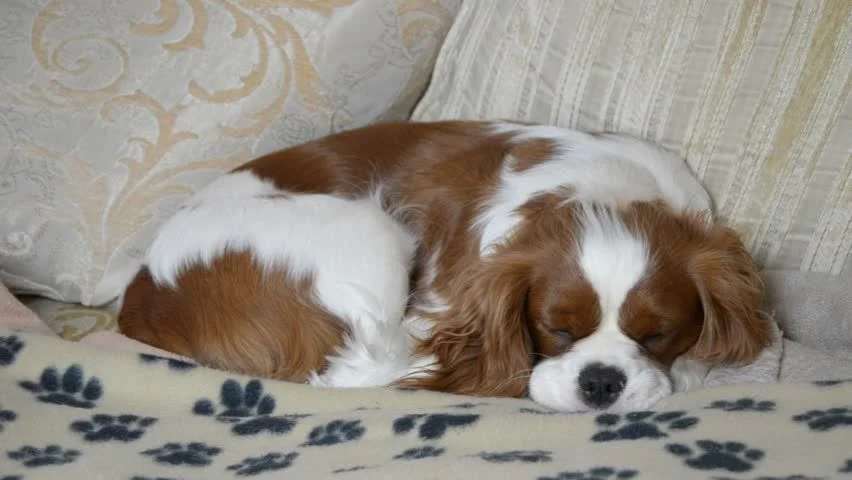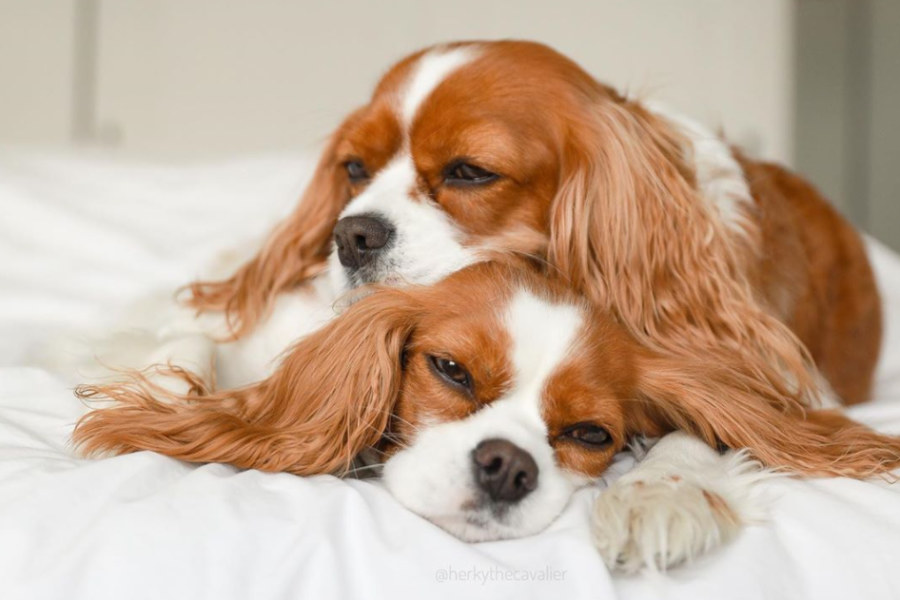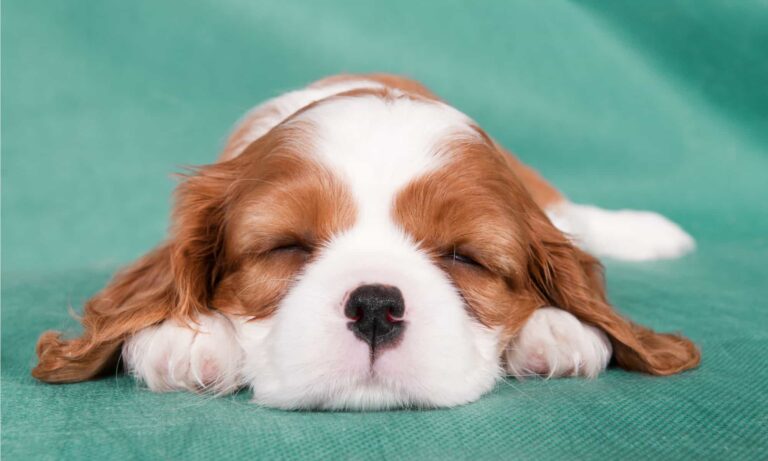You may have noticed your dog isn’t busy such as walking, playing, or eating, you’ll often find him asleep. Moreover, It can happen to them because of their Age, Activity Level, Wellness, Nutrition Alterations in Routine or Setting
Moreover, The Cavalier King Charles Spaniel is a popular breed among dog owners because of its attractive loyalty and friendly nature. They tend to sleep more than other dogs, which is an obvious characteristic that sets them apart.
You will learn about the reasons for this, as well as how to care for them when they sleep so much.
Why does cavalier King Charles sleep so much?
Age: Sleep patterns often differ with age, as puppies and older dogs generally spend more time sleeping than young adults and middle-aged dogs. If your canine falls into one of these age categories, an increased need for sleep might be entirely customary.
Activity Level: An insufficient dose of physical or mental engagement during the day might lead your pet to indulge in more sleep as a consequence of monotony.
Wellness: Certain health conditions, such as hypothyroidism, could be responsible for augmented sleep in your dog. Additional symptoms of health problems encompass alterations in behavior or appetite, fluctuations in weight, and signs of physical discomfort.
Nutrition: Inadequate nutrients or energy from your dog’s diet could prompt them to sleep more as a way to conserve their energy stores.
Alterations in Routine or Setting: Modifications to your dog’s daily routine or environment have the potential to incite stress or anxiety, subsequently influencing their sleep patterns.
How long do Cavalier King Charles Spaniels sleep?

On average, a healthy adult may rest for approximately 12 to 18 hours each day.
However, it’s crucial to recognize that each dog possesses distinct traits, and their sleep needs can fluctuate based on factors like age, level of activity, well-being, and individual temperament.
Puppies in their early stages might necessitate more sleep, whereas senior dogs could extend their sleeping hours due to reduced physical engagement.
Moreover, ensuring that your Cavalier King Charles Spaniel engages in sufficient exercise and mental stimulation while awake is essential to avert obesity and foster their overall health and vitality.
Remember, if any concerns arise regarding your dog’s sleep patterns or general health, consulting a veterinarian is always advisable.
How much do Cavalier King Charles puppies sleep?
The majority of puppies dedicate ample hours to resting and slumber, primarily due to the requirements of their puppy phase and swift development.
Further, Puppies commonly engage in intense bouts of play, which are succeeded by periods of sleep. This cycle of play and rest continues, with the puppy alternating between vigorous play sessions and replenishing sleep.
As your Cavalier pup matures, the duration of their play sessions will expand, while their sleep periods will diminish.
In certain instances, a puppy might snooze for up to 20 hours a day—a sleep schedule that aligns with, or even slightly surpasses, the sleep habits of the typical human teenager.
Are Cavaliers lazy dogs?
All dogs, including Cavaliers, have the potential to display periods of laziness, yet it wouldn’t be accurate to broadly label the entire breed as inherently lazy.
Similar to other dog breeds they can exhibit varying activity levels, ranging from highly active to more sedentary, contingent on their owners’ engagement.
It is essential to emphasize that their behavior is greatly influenced by their owners and the level of activity pets provide. Nonetheless, it’s worth noting that they do take pleasure in their cozy comforts and tend to relish a leisurely lifestyle.
What are the Characteristics of Cavalier King Charles Spaniels?
Affectionate Nature: Cavaliers are well known for their warm and caring personalities. They develop deep relationships with their owners and enjoy company, frequently seeking cuddles and close physical contact.
Kind and friendly: These dogs are extremely gregarious and get along well with both people and other animals. Because of their affable demeanor, they make wonderful family dogs and are ideal for households with children or other pets.
Playful and Energetic: despite their calm attitude, are energetic and love engaging in interactive games with their owners. They have a moderate level of energy and enjoy regular walks and fun.
Trainability and intelligence: This breed is intelligent and generally easy to teach. They are anxious to please their owners and respond strongly to positive reinforcement.
Loyal and Devoted: They are extremely loyal to their families and demonstrate undying love to their owners. They are attentive and frequently strive to be around them.
Intelligence and Trainability: Besides being intelligent and generally easy to train. They respond well to positive reinforcement and are eager to please their owners.
Loyal and Devoted: Cavaliers are highly loyal to their families and show unwavering devotion to their owners. They are attentive and often seek to be by their side.
Versatility: Adaptable to a variety of lifestyles, whether they live in an apartment or a house with a yard. They are equally content as indoor companions or as outdoor buddies.
Grooming Needs: they have long, silky coats that need to be groomed on a regular basis to keep them looking their best. Brushing and trimming are required to keep their coat in good shape.
What are some of the health and genetic factors?

Mitral Valve Disease (MVD): MVD is a common heart condition in Cavaliers. Regular heart check-ups are essential for early detection and management of this condition.
Syringomyelia (SM): SM is a neurological disorder in which cavities or fluid-filled sacs form within the spinal cord. It can cause discomfort, pain, and neurological symptoms, especially if the skull is too small for the brain, a condition known as Chiari malformation.
Ear Infections: Their long, floppy ears can trap moisture and debris, making them more prone to ear infections. Regular ear cleaning and grooming are essential to prevent these issues.
Eye Problems: Regular eye check-ups can help identify eye problems.
Luxating Patella: This condition involves the dislocation of the kneecap and can cause lameness and discomfort. It is more commonly seen in smaller dog breeds, including Cavaliers.
Hip Dysplasia: While not as prevalent in Cavaliers as in some larger breeds, hip dysplasia can occur. It is a condition where the hip joint does not form properly, leading to joint problems and discomfort.
FAQs
How can I ensure my Cavalier King Charles Spaniel gets enough quality sleep?
Make sure your pet has a peaceful and pleasant place to sleep to ensure they receive enough good rest. Establish a regular sleep schedule and make sure they get regular exercise and mental stimulation while they are up. Furthermore, limit interruptions during their assigned sleeping hours to encourage unbroken sleep.
Should I be concerned if my Cavalier King Charles dog sleeps more than usual?
Yes, excessive sleep might indicate health issues such as hypothyroidism, heart problems, or even pain. Consult a vet if you’re concerned.
How can I ensure my Cavalier King Charles dog’s sleep patterns are healthy?
Yes, Provide a balanced diet, regular exercise, mental stimulation, and comfortable sleeping areas. Monitor for changes in behavior.
Are there specific health reasons why Cavalier King Charles dogs sleep excessively?
No, While Cavaliers may sleep more due to their breed characteristics, excessive sleep could indicate health issues. Consult a vet if you notice drastic changes in sleep patterns.
Are there signs to watch for if my Cavalier King Charles dog’s sleep changes suddenly?
Yes, Watch for signs like increased lethargy, difficulty waking up, changes in eating habits, or any sudden behavior changes.
Can I help regulate my Cavalier King Charles dog’s sleep schedule?
Yes, Establish a consistent routine for feeding, playtime, and sleep. Ensure your dog gets enough exercise and mental stimulation during the day.
Conclusion
Overall, their sleeping habits are determined by a variety of aspects such as age, well-being, nutrition, and so on
By looking over all the factors, you can easily take good care of them.
On the other hand, By embracing their innate resting habits and offering them sensitive loving care, we can form long-lasting connections with these beautiful canines and cherish the company they provide to our lives.

